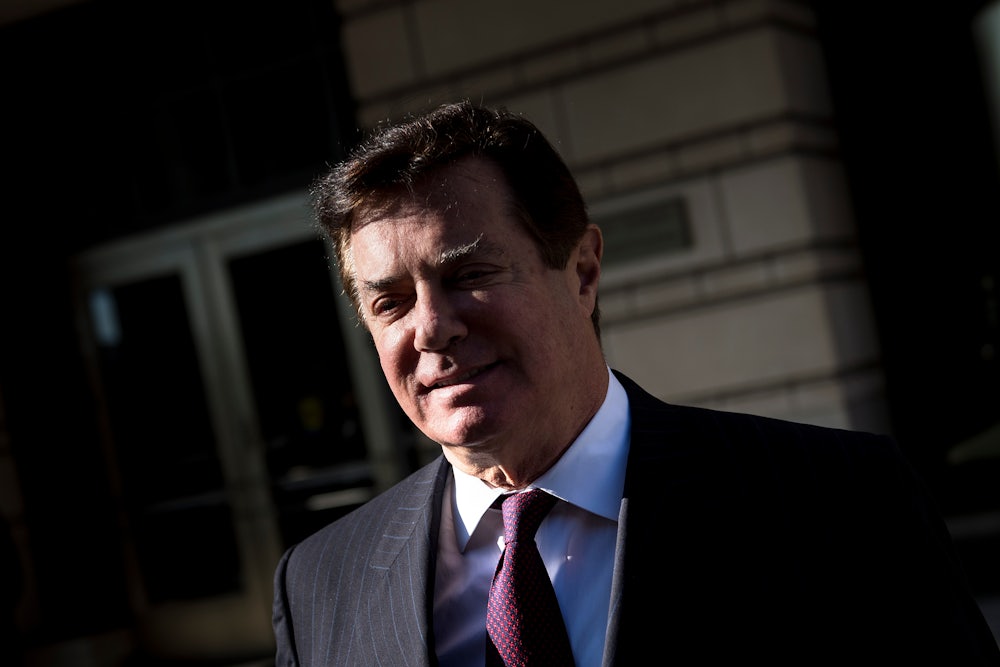Paul Manafort, once the chairman of Donald Trump’s 2016 campaign, will spend the next seven and a half years of his life in prison, barring early release or a pardon by the president. After being sentenced last week to nearly 4 years in prison for tax and financial fraud, he was sentenced Wednesday to an additional 43 months for witness tampering and conspiring against the United States. Many observers claim he got off easy.
“Looking at the totality of what he did and the totality of the sentences, both last week and now, Paul Manafort caught a break,” Democratic Senator Richard Blumenthal, the former attorney general of Connecticut, said on MSNBC. “This overall sentence is exceedingly lenient.” Vox’s Aaron Rupar quipped that “Manafort will be released from prison in time to run Donald Trump Jr.’s 2028 presidential campaign.” And USA Today’s Brad Heath, tweeted, “Technically, this is another way-below-guideline sentence for Manafort.”
It’s true that Manafort could’ve fared worse: Federal sentencing guidelines had recommended 19-24 years in the first case, and 22 years in the second. It’s also true, as many pointed out last week, that certain high-profile white-collar offenses are treated leniently compared to the ultra-repressive sentences routinely inflicted for other crimes. Manafort is a corrupt, unrepentant hustler who never should have gotten away with his crimes for as long as he did, and his sentence inevitably appears lenient when compared—as Senator Elizabeth Warren has done—with a homeless man with a relatively minor record who was sentenced to life in prison after selling $20 in pot. But that doesn’t mean he deserves to spend the next three decades in prison.
As a former public defender, I saw firsthand that the American justice system is extraordinarily unequal. My destitute black and Latino clients in New York City regularly faced much longer sentences than Manafort, sometimes for much less wrongdoing. Nevertheless, I don’t believe Manafort should be treated as mercilessly as my clients were. Rather, in a true liberal democracy, no one would be treated this way.
Before the 1980s, America’s incarceration rate was much lower and closer to those of other Western democracies. The principle of rehabilitation also played a relatively significant role in American justice. Today, America is an outlier. Its incarceration rate is the highest in the world—almost five times that of England and Wales, nearly six times Canada’s, and eleven times higher than in Sweden. One reason these other nations don’t have mass incarceration—and have abolished the death penalty—is that reformers there have mounted influential movements denouncing the inhumanity of prisons, life sentences, and executions per se. Americans seem to have fewer moral reservations about inflicting draconian punishments and making wrongdoers suffer.
Challenges to long prison terms have gone the farthest in Europe. In 2013, the European Court of Human Rights abolished life without parole because it is an “inhuman or degrading” punishment. Life without parole already was rarely used in Europe by then. This reflects a broader principle that all prisoners should be treated with “human dignity” and that very long sentences should rarely be used. Generally, they should be reserved for the “worst of the worst” or for genuinely dangerous persons. Even in these cases, “locking them up and throwing away the key” is no longer allowed. The ECHR recognizes that every person should have a chance at rehabilitation.
In modern America, even liberals seem to have become inured to ruthless punishments. Their criticism of mass incarceration is largely limited to its racism, counter-productivity, and financial cost. The same can be said about the death penalty, if one adds the argument that executions pose an inherent risk of killing the innocent. These administrative and procedural concerns are undoubtedly valid. However, they are different than opposing such punishments on moral grounds.
The main beneficiaries of the universal human rights approach in Europe have been the poor and racial or ethnic minorities. They still face discrimination, yet are not subjected to the death penalty or life without parole. And their prison terms tend to be much shorter than in America. Categorical opposition to harsh punishments in the U.S. would disproportionately benefit African Americans and Latinos, who are drastically overrepresented in jails and prisons. This social change would additionally help poor whites, who represent a larger share of prisoners than people realize.
There’s a misperception in America that mass incarceration is largely driven by petty, nonviolent offenders who receive harsh sentences as part of the “War on Drugs.” In reality, 54 percent of state prisoners are serving time for violent crimes. Democratic politicians who cast themselves as champions of criminal justice reform often exclude violent offenders from reform proposals, perhaps out of fear of being labeled “soft on crime.” But reducing the incarceration rate will require shorter sentences for these offenders, too.
While Manafort is not the poster child for mass incarceration, his case reveals America’s deep, disturbing attraction to harsh punishment—even among some on the left, who seem to relish the idea that he might die in prison. Locking up more people like Manafort, and throwing away the key, will just add more people to the prison population. If the left truly believes that mass incarceration is not only unfair but immoral, it cannot make exceptions for wrongdoers it finds unsympathetic. A homeless pot dealer doesn’t deserve to die in prison, and neither does Paul Manafort.
Human beings do not belong behind bars. If more Americans denounced draconian punishments as a matter of principle, if they were warier of prisons than of prisoners, a social shift on mass incarceration might be within reach.
